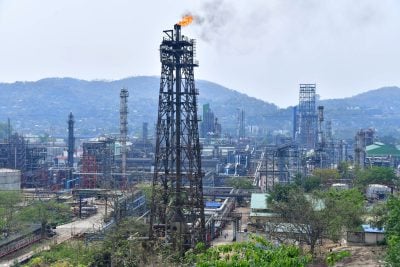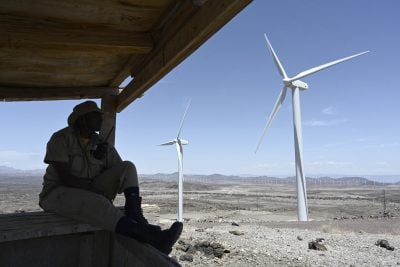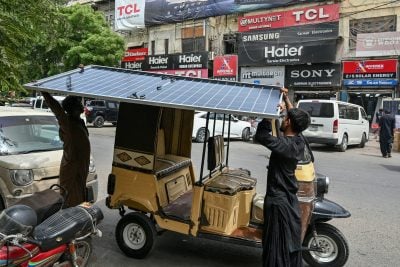In an era of rampant wildfires, tropical cyclones and the worst floods in a decade, the outcome of this year’s UN Climate Conference (Cop27) is set to determine the fate of millions of Africans.
The 17-day event, held in the Sinai resort of Sharm el-Sheikh in Egypt, comes as African governments grapple with spiralling debt, a global food crisis and the fallout of an acceleration of existential climate-induced natural disasters.
Cop27 – the 27th conference to be held under the auspices of the UN Framework Convention on Climate Change – provides a forum for world governments to discuss how to deal with the effects of climate change.
Although Africa only contributes about 4% of all global emissions, scientists say it is the world’s most vulnerable region to climate change.
The ‘implementation Cop’
Cop has been criticised in the past for being all talk and no action. African negotiators went to Cop26 in Glasgow last year with an ambitious list of demands to fight climate change, but experts say the summit failed Africa and efforts to avert a climate crisis.
This year, the Egyptian presidency has set out the goal of making Cop27 the “implementation Cop”, where commitments are transferred into action.
The conference is focusing on four main areas:
- Mitigation
- Adaptation
- Finance
- Collaboration
The event began with two days of addresses by world leaders, which are being followed by thematic days that include panel discussions, roundtables and side events.
An important victory for developing countries in the lead-up to the conference was managing to place the contentious issue of “loss and damage” on the agenda.
This goes beyond discussion of ways to adapt and mitigate the effect of climate change to examining the ways in which the world’s poorest countries have already suffered great human and economic losses through climate change and how they should be compensated for it.
Day 1 – Sunday
Egypt’s foreign minister, Sameh Shoukry, was formally elected as the Cop27 president during the opening plenary, following which he called on countries to show faith in multilateralism over the next two weeks as they negotiate to deliver on the goals of the Climate Convention and the Paris Agreement.
Addressing climate envoys and delegates, he said: “It comes as no surprise to anyone that the Cop is being held this year in a world which is witnessing political turmoil that cast a long shadow on all our nations and has resulted in energy and food crises; however these challenges should be no reason for delaying our collective effort to fight climate change. It is inherent on us all in Sharm El-Sheikh to demonstrate our recognition of the magnitude of the challenges we face and our steadfast resolve to overcome it.”
Day 2 – Monday
As global leaders opened the summit with speeches on Monday, Macky Sall, president of Senegal and chair of the African Union (AU), laid out the continent’s stall.
“We have come as Africans to Sharm el-Sheikh in order to save our planet. We are determined to make history rather than simply being victims,” he said.
“Even if Africa only contributes less than 4% of greenhouse gas emissions, Africa subscribes to the ultimate goal of carbon neutrality, but within the framework of a concerted, fair and equitable energy transition – instead of unilateral decisions that harm our development processes – including universal access to electricity, of which 600m Africans are still deprived,” Sall said.

For Sall, the development of a “fair and equitable” transition will be no less than an acceptance that Africa be allowed to continue its development of gas reserves, as he has pointed out in a number of speeches during his tenure as chair of the AU. But the issue remains a fraught one, with some environmentalists arguing that establishing gas industries will only distract from the crucial embrace of renewables like solar, wind and hydro.
As one of several African countries that could play host to a major emerging LNG industry, Senegal has every reason to put gas firmly on the agenda.
While the debate will continue to rage, many African leaders will see the issue of gas as a major test of whether richer world powers will allow poorer nations to balance their development with climate commitments, or set one rule for themselves and another for the rest. Solving the gas conundrum could be key to a solid outcome from the talks.
Day 3 – Tuesday
In his address on the second day of national declarations by global leaders, President Nana Akufo-Addo of Ghana criticised the failure of developed countries to make good on their 13-year-old pledge to make $100bn available annually to developing countries to fight the effects of climate change.
“It is critical, in this regard, that the developed world makes good its long-delayed pledge to mobilise and make available $100bn annually to the poorer countries to assist in the fight against climate change and commit, as agreed at Cop26 in Glasgow, to doubling resources for adaptation,” he said.
The president of host country Egypt, Abdel Fattah al-Sisi, together with the Norwegian prime minister, Jonas Gahr Støre, attended the commissioning ceremony for the continent’s first green hydrogen plant, located in the Suez Canal Economic Zone in Egypt.
Sisi also witnessed the signing of an agreement to develop one of the world’s largest onshore wind projects in Egypt, alongside the president of the United Arab Emirates (UAE). The memorandum of understanding was penned between the UAE’s state-backed renewable energy firm Masdar, Egypt’s main renewable energy developer Infinity and Hassan Allam Utilities, a statement on news agency WAM said.
Tuesday’s proceedings also marked the launch of the Africa Carbon Markets Initiative (ACMI), a bid to support the production of African carbon credits, while also ensuring that carbon-credit revenues are transparent, equitable, and channelled towards job creation.
Day 4 – Wednesday
Wednesday was the first of the conference’s thematic days, focusing on finance.
Climate-proofing the continent’s most vulnerable communities and ensuring the continent has the cashflow to deal with the fall-out of natural disasters has dominated the agenda at Cop27.
The International Capital Market Association (ICMA), which sets the rules in the bond market, laid out plans for countries hit by climate induced natural disasters, such as flooding and hurricanes, to automatically freeze debt payments.
The ICMA introduced new “climate resilient debt clauses” or CDRCs, specifically targeting low-income countries, that governments can plug into soveriegn bonds they sell to raise money on global capital markets.
With many African countries on the brink or knee-deep in a debt crisis, the mechanism will allow them to pause debt payments for a maximum of 2 years to free up cash flow to provide aid and assistance to battle climate disasters.
Also on Wednesday, a group of over 85 African insurers unveiled the African Climate Risk Facility (ACRF) to help climate-proof the continent’s most vulnerable communities.
The commitment will provide protection for 1.4bn people against floods droughts and tropical cyclones by providing $14bn in climate risk insurance to 2030 to African sovereigns, cities, aid agencies and NGOs.
Both measures will help to bridge the gaping climate risk financing gap on the continent as rich nations continue to shrug off demands for compensation for countries due to loss or damage caused by global warming.
In addition, the African Union, the African Development Bank Group and Africa50 – in partnership with several global partners – launched the Alliance for Green Infrastructure in Africa (AGIA), an initiative to help scale and accelerate financing for green infrastructure projects on the continent.
Day 5 – Thursday
Day 4 of Cop27 brought science to the forefront of the discussions around climate change.
At the event “Unified Global Scientific Research”, academics stressed the need for science to consistently guide the response to the climate crisis, and highlighted the vital importance of data sharing within the scientific community. For that to happen in Africa, unlocking finance for the continent’s research centres and universities is crucial.
Since 1990, African scientists have received less than 15% of the funds allocated to global climate change research. Even when research funding focuses on African topics, 78% goes to researchers based in the United States and Europe. Scientists based in Africa have long stressed that funding needs to be rebalanced if they are to take their place in the frontline on the battle against climate change.
As well as this key discussion, several Africa-related climate financing announcements were made on Thursday:
- The US government’s Millennium Challenge Corporation (MCC), along with USAID, announced that they will work together to expand the use of green financing in low- and lower-middle-income countries, especially targeting Mozambique and Zambia, through a Joint Green Finance Pilot Program. In total, MCC has invested roughly $1.5bn in climate-related activities between 2015-2020 and expects to invest an additional $1bn between 2021-2024.
- The African Finance Corporation and the Islamic Development Bank, through the Islamic Corporation for the Insurance of Investment and Export Credit, say they will cooperate in promoting joint action in the origination, financing, and execution of Climate Action projects through credit and investment insurance support in African member states.
Day 6 – Friday
Panel discussions around pathways to decarbonise the highest emitting economic sectors gathered high-ranked personalities such as John Kerry, US Special Presidential Envoy for Climate, and Dr Amani Abou-Zeid, Commissioner for Infrastructure, Energy and Digitalisation at the African Union.

The debate is of significant importance for African economies. In countries prone to economic instability and inflation, and where the funding of public services is constantly challenged, reducing emissions is not always the number one priority, especially as the continent contributes less than 4% of the greenhouse gas emissions.
However, the transition in the developed world, as currently conceived, cannot be realised without the natural resources (wind, sun, water) and raw materials from the African continent. Africa thus stands to benefit greatly from developing its renewable resources.
The question for African leaders, therefore, is how to enable fast-growing renewables developments that will help Africa itself and the rest of the world to reduce emissions, while at the same time fostering economic development at home.
As the CEO of the Africa Finance Corporation said at the Africa Renewables Forum, which took place on Thursday, “The crisis we are facing now is about resources and Africa is instrumental to the solution. We must focus on exporting value-added products for the structural transformation of our economies.”
No African countries can reduce their carbon footprints alone, or ignore the crucial importance of economic development. However, they can create value and livelihoods by helping the world decarbonise, and realise huge financial gains from it. It’s a win-win situation.
Day 8 – Monday
One week into the conference, and pressures are mounting over the myriad details of a potential climate deal, and an agreement to shield and compensate climate vulnerable countries from the fallout of global warming.
Day 8 of the conference was a watershed moment, as the UN published a text outlining funding arrangements for addressing loss and damage for countries hit by natural disasters.
The plan, which aims to have a decision no later than 2024, may include a fund that would allow parties to launch a process for compensation.
The same day, the G8 launched a plan called “Global Shield” which aims to rapidly mobilise pre-arranged insurance and disaster protection finance after events such as floods, droughts and hurricanes.
Over the next few months, the scheme intends to rapidly mobilise pre-arranged insurance and disaster protection finance after events such as floods, droughts and hurricanes in places like Pakistan, Ghana, Fiji and Senegal.
“Global Shield” will be backed by $175 million in funding from Germany, and $41 million from other donors including Denmark and Ireland.
But given that the plan is based on insurance payments, as opposed to grants, sceptics have raised fears that this could add to the spiralling costs of already cash-strapped governments.
Other climate activists fear that wealthier G7 countries are pushing the plan as a substitute for a loss and damage fund.
Adding to tensions is anxiety among negotiators about resolving the byzantine details of a climate deal in time for the summit’s scheduled close on Friday.
Stay tuned as we watch the week’s events unfold!
Day 9 – Tuesday
As talks in Sharm entered their final week, Tuesday marked an energy-themed day, with efforts to expand access to clean electricity dominating the discussion.
Two new initiatives were launched as ministers and industry leaders met for the 9th day:
The Global Renewable Hydrogen Council Initiative aimed at accelerating green hydrogen projects in Africa, and the Africa Just & Affordable Energy Transition Initiative, to facilitate affordable energy for at least 300 million people on the continent.
Bloomberg also released the 2022 edition of its annual Climatescope survey providing critical and timely insights into the state of Africa’s energy sector:
The good news is that the total installed power-generating capacity on the continent jumped from 111GW in 2006 to 249GW in 2021, an impressive 123% increase. However, this represents just 3% of installed global capacity, a share which has remained stable over the past 15 years despite the continent’s burgeoning, power hungry population.
But the report shows signs that decision-makers are starting to grasp the opportunities offered by renewables.
In 2021, 36 out of 42 markets in Africa had policies targeting renewable energy, the survey shows. But the missing ingredient is legislative frameworks to put pressure on governments and translate policy to action.
Only if financial and regulatory barriers are addressed can solar energy in sub-Saharan Africa, reach over 400GW in 2050 and close the continent’s electricity gap, as BNEF’s New Energy Outlook predicts?.
COP27 provides the right platform to launch progressive initiatives to electrify Africa. Now it’s the job of legislators to act on them.
Additional reporting by David Thomas, Leo Komminoth and Charles Dietz
Want to continue reading? Subscribe today.
You've read all your free articles for this month! Subscribe now to enjoy full access to our content.
Digital Monthly
£8.00 / month
Receive full unlimited access to our articles, opinions, podcasts and more.
Digital Yearly
£70.00 / year
Our best value offer - save £26 and gain access to all of our digital content for an entire year!
 Sign in with Google
Sign in with Google 



